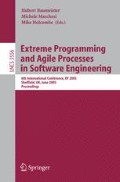Abstract
Many authors complain the lack of empirical studies which assess the benefits and the drawbacks of agile practices. Particularly, pair programming rises an interesting question for managers: does pair programming mean to pay two developers in the place of one? We realized an experiment to compare the productivity of a developer when performing pair programming and when working as solo programmer. We obtained empirical evidence that pair programming decreases the effort of the single programmer.
Access this chapter
Tax calculation will be finalised at checkout
Purchases are for personal use only
Preview
Unable to display preview. Download preview PDF.
References
Abrahamsson, P., Koskela, J.: Exterme Programming: A Survey of Empirical Data from a Controlled Case Study. In: Proc. of International Symposium on Empirical Software Engineering, Redondo Beach, CA, pp. 73–82. IEEE CS Press, Los Alamitos (2004)
Basili, V.R.: Software modeling and measurement: The Goal/Question/Metric paradigm. Technical Report CS-TR-2956, Department of Computer Science, University of Maryland, College Park, MD 20742 (1992)
Baheti P., Williams L., Gehringer E., Stotts D., McC.Smith J.: Distributed Pair programming: Empirical Studies and Supporting Environments. Technical Report TR02- 010, Department of Computer Science, University of North Carolina at Chapel Hill (March 2002)
Basili, V., Shull, F., Lanubile, F.: Building Knowledge Through Families of Experiments. IEEE Transactions on Software Engineering IEEE CS Press 25(4) (1999)
Bellini, E., Canfora, G., Cimitile, A., Garcia, F., Piattini, M., Visaggio, C.A.: The impact of educational background on design knowledge sharing during pair programming: an empirical study. In: Proc. of Knowledge Management of Distributed Agile Processes 2005, Kaiserslautern, Germany, April 2005. LNCS, Springer, Heidelberg (2005)
Canfora, G., Cimitile, A., Visaggio, C.A.: Lessons learned about Distributed Pair programming: what are the knowledge needs to address? In: Proc. of Knowledge Management of Distributed Agile Process-WETICE, Linz, Austria, pp. 314–319. IEEE CS Press, Los Alamitos (2003)
Canfora, G., Cimitile, A., Visaggio, C.A.: Working in Pairs as a Means for Design Knowledge Building: An Empirical Study. In: Proc. of 12th International Workshop on Program Comprehension, Bari, Italy, pp. 62–69. IEEE CS Press, Los Alamitos (2004)
Carver, J., Jaccheri, L., Morasca, S., Shull, F.: Using Empirical Studies during Software Courses. In: Conradi, R., Wang, A.I. (eds.) ESERNET 2001. LNCS, vol. 2765, Springer, Heidelberg (2003)
Cockburn, A.: Agile Software Development. Addison-Wesley Pub. Co., Reading (2001)
Gallis, H., Arisholm, E., Dyba, T.: An Initial Framework for Reasearch on Pair Progamming. In: Proc. of International Symposium on Experimental Software Engineering, Rome, Italy, pp. 132–142. IEEE CS Press, Los Alamitos (2003)
McDowell, C., Werner, L., Bullock, H., Fernald, J.: The Effects of Pair Programming on Performance in an introductory Programming Course. In: Proc. of the 33rd Technical Symposium on Computer Science Education, Northern Kentucky - The Southern Side of Cincinnati, March 2002, ACM, New York (2002)
Kitchenham, B., Pfleeger, S., Pickard, L., Jones, P., Hoaglin, D., El Emam, K., Rosenberg, J.: Preliminary Guidelines for Empirical Research in Software Engineering. IEEE Transactions on Software Engineering IEEE CS Press 28(8) (2002)
Höst, M., Regnell, B., Wholin, C.: Using Students as Subjects. A comparative Study of Students & Professionals in Lead-Time Impact Assessment. In: Proc. of 4th Conference on Empirical Assessment & Evaluation in Software Engineering, EASE (2000)
McDowell, C., Werner, L., Bullock, H., Fernald, J.: The Impact of Pair Programming on Student Performance, Perception and persistence. In: Proc. of the Int.l Conference on Software Engineering (ICSE 2003),Portland, Oregon, USA, pp. 602–607. IEEE CS Press, Los Alamitos (2003)
Nawrocki, J., Wojciechowski, A.: Experimental Evaluation of Pair Programming. In: Proc. of European Software Control and Metrics (2001)
Nosek, J.T.: The case for collaborative programming. Communication of ACM 41 (1998)
Van Der Grift, T.: Coupling Pair Programming and Writing: Learning About Students, Perceptions and Processes. In: Proc. of SIGCSE, ACM, New York (2004)
Wernick, P., Hall, T.: The impact of Using Pair Programming on System Evolution: a Simulation.Based Study. In: Proc.of the 2.th Int.l Conference on Software Maintenance (ICSM 2004), Chicago, Illinois, USA, pp. 422–426. IEEE CS Press, Los Alamitos (2004)
Williams, L., Cunningham, W., Jeffries, R., Kessler, R.R.: Straightening the case for pair programming. IEEE Software 17(4) (2000)
Williams, L., UpChurch, R.L.: Support of Student Pair-Programming. In: Proc. of the thirty-second SIGCSE Technical symposium on Computer Science Education, Charlotte, NC, ACM, New York (2001)
Williams, L., McDowell, C., Nagappan, N., Fernald, J., Werner, L.: Building Pair programming Knowledge through a Family of Experiments. In: Proc. of International Symposium on Experimntal Software Engineering, Rome, Italy, pp. 143–153. IEEE CS Press, Los Alamitos (2003)
Williams, L., Kessler, B.: The Effects of Pair-Pressure and Pair-Learning. In: Proc. of 13th Conference on Software Engineering Education and Training, Austin, Texas, pp. 59–65. IEEE CS Press, Los Alamitos (2000)
Williams, L., Shukla, A., Anton, A.I.: An Initial Exploration of the relationship betwee Pair programming and Brooks law. In: Agile Development Conference (ADC 2004), Salt Lake City, Utah, USA, pp. 11–20. IEEE CS Press, Los Alamitos (2004)
Author information
Authors and Affiliations
Editor information
Editors and Affiliations
Rights and permissions
Copyright information
© 2005 Springer-Verlag Berlin Heidelberg
About this paper
Cite this paper
Canfora, G., Cimitile, A., Visaggio, C.A. (2005). Empirical Study on the Productivity of the Pair Programming. In: Baumeister, H., Marchesi, M., Holcombe, M. (eds) Extreme Programming and Agile Processes in Software Engineering. XP 2005. Lecture Notes in Computer Science, vol 3556. Springer, Berlin, Heidelberg. https://doi.org/10.1007/11499053_11
Download citation
DOI: https://doi.org/10.1007/11499053_11
Publisher Name: Springer, Berlin, Heidelberg
Print ISBN: 978-3-540-26277-0
Online ISBN: 978-3-540-31487-5
eBook Packages: Computer ScienceComputer Science (R0)

